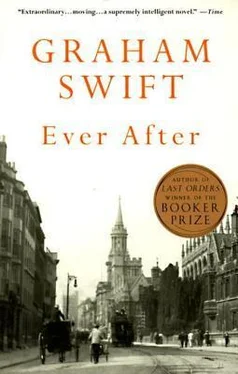And, for contrast and to go back to where it all seems to have begun (what was an ichthyosaur to anybody ?), consider the life of Mary Anning, of Lyme Regis, who was only twelve years old when she stumbled on that first thirty-foot fossil skeleton.
Was she horrified? Was she shaken? No. Was her universe turned upside down? No. True, she was only a child. But she was a shrewd enough twelve-year-old. She sold that first skeleton for twenty pounds. She went on to discover not only more ichthyosaurs but the first specimens of plesiosaur and pterodactyl, and she made a living and a name for herself out of her flair for fossils. Lyme Regis enjoyed a tourist boom. Renowned and learned men came to call. These included, one day, no less a person than the King of Saxony, to whom Mary is supposed to have remarked, pertly but without falsehood: “I am well known throughout the whole of Europe.…”
Perhaps all her life Mary only saw herself as a successful purveyor of wonders, a dealer in Mesozoic freaks. Leave others to ponder the meaning of her treasure trove. Was she happy, this daughter of a humble carpenter (she buried him when she was eleven and dug up a monster when she was twelve), who lived her life and found fame among bones? It was not a long life. When Matthew came to Lyme and, quite possibly, met her, she was forty-five. She would die two years later, of breast cancer. Would she have wanted (silly question) some other kind of life? Did it please her to know that posterity would not forget her? Did she ever reflect that her fate was little different from that of that unsuspecting ichthyosaur, that particular ichthyosaur, that expired long ago in some embalming lagoon, little knowing that after millions of years it would be resurrected by the touch of a twelve-year-old girl into the amazed consciousness of another race of animals, and be placed on show in one of their great museums?
Alas, poor ichthyosaur …
And everyone has this saving counter-logic, this belief in make-belief. Yes, that may be so, but — it’s not the end of the world.
I see a graveyard scene. Not Hamlet juggling a jester’s skull. A family group. Two are no more than infants, and there is a third child, not present, who is too young even to know what has happened. There is Elizabeth and there is Matthew. And there is the Rector, performing manfully one of the more testing duties of his clerical career. Pale spring sunlight on the hummocked turf, the tiny coffin.
What do I know of Matthew? I conjure him up, I invent him. I make him the protagonist (a touch of Potter’s TV temerity) of this “dramatized version.” I drag him into the light. He might have been no more than the bland words on a mossy gravestone. Sleeping inscrutably beside his wife and little son. Instead of which.
If he hadn’t married a rector’s daughter. There might have been no terrible rupture, he might have spoken without destroying, without being condemned. The day might never have come, fifteen years later, when he stormed out of the Rectory, leaving the Rector, head in hands, in his study and still in that ridiculous bee-keeping garb, and walked back to confront Elizabeth — who might, on that June evening, have picked up the clock, the clock of their union, and smashed it against the wall: there! If all creation was at fault, who cared about a little clock? But she didn’t. Plainly she didn’t.
The rescue of his marriage becoming a trap. But what was the trap? He loved her and she loved him: the world was good again. And wasn’t that the case, wouldn’t that be just as true — a question even a rector’s daughter might have put to him — whether it was God’s world or not?
He didn’t have to tell me. He didn’t damn well have to say a thing. All he had to do was keep his mouth shut. He’d kept it shut for forty years. And if he’d bided his time just a little bit more, prolonged the dilemma just a little bit further, the matter would have been settled in any case by that fatal rendezvous in a Frankfurt hotel.
And I might never have found myself, in this den of learned inquiry, compelled to pursue yet another line of research — one with nothing of the academic about it, and one, you may judge, rather more germane to me than the notebooks of Matthew Pearce.
You might have supposed that my mother’s death — the equity of mutual widowerhood — would have settled all scores between my late stepfather (and dearly remembered benefactor) and me. What stored-up venom of guilt and blame, what recriminations that remained from those far-off days in Paris, might have been annulled by the amnesty of bereavement. The fact is that, following my mother’s death, Sam became afflicted with an attack of conscience, an agony of duty, a positive seizure of moral responsibility. Hardly the Sam of yore. Hardly Mr Plastic. Hardly, either, the Sam of a Frankfurt hotel. But you never know, it seems, the people you thought you knew.
A not so uncommon symptom of grief? But I don’t think Sam was so sorely stricken. You have to remember that my mother was seventy-eight. People do die at that age. I would have said (though I know now there was more to it) that it was simply the fact of death — how to deal with it, how to get away from it as quickly as possible — that implanted that look of terror on Sam’s face when I emerged, that glowing evening, from my last meeting with my mother. Fear, yes; grief, I’m not so sure. As to the hole that his wife’s death left in his life, Sam had a simple and well-tried expedient for this, one that he had been applying, in fact, for a considerable time before my mother breathed her last: substitoots. It was in the embrace of one such substitoot (not to say prostitoot) that Sam himself breathed his last, some nine months after his wife’s funeral. And if I were asked to describe in a word the bereft husband’s demeanour and behaviour at that sad ceremony, I would have to say: shifty.
On the question of grief in general — but with particular reference to mine — Sam was obliged to adopt a cool and unsentimental line, in keeping with the realities of stepfatherhood, with the circumstances of his entry into my life all those years ago in Paris, not to mention with the role he had unwittingly been playing, of Claudius to my Hamlet—“Fie, ’tis a fault to heaven, a fault against the dead …” Thus his ability to bury my mother and carry on with life with a minimum of morbid fuss merely proved his consistency and demonstrated, moreover, how I should have behaved with Ruth.
But, in fairness to Sam, his world was neither as regular nor as callous as this. My grief undoubtedly troubled him . It gnawed at him; isn’t that why, to take the kinder view of the deed, he had me moved in here? My picture of things is — fuller — now, but it seemed that that shiftiness at my mother’s funeral carried an element of apology. As if he were saying, comparing his scant powers of mourning to mine: I’m sorry — it’s the best I can do.
And along with the hint of apology there was a measure of genuine, vaguely envious incomprehension. No, he didn’t understand it, this — romantic love. It was some other sort of glue, a durable, serviceable and remarkably flexible glue, that had held him and my mother together for so long. But if pressed on the point — I never did press him on the point; I should have tried that last day I saw him — Sam might have admitted that this marriage to my mother was itself a kind of long-term, plausible “substitoot”: Ruth and I were the real thing.
You never know the people you think you know. How could I have foreseen that my arch-enemy Sam, the man who had pronounced such merciless judgement on my future, would one day take me to one side and, with a halting attempt at a wink and a nudge, want to know what my “secret” was? He should have spoken about secrets. How could I have known, during those rampant days in Paris, that this man who had the run, to say no more, of our apartment, would one day complain to me, as if I were some chafing fellow, free spirit, about this woman (my mother) who seemed so unfairly and stubbornly unwilling to let him go out to play. (Not that she actually stopped him.)
Читать дальше












